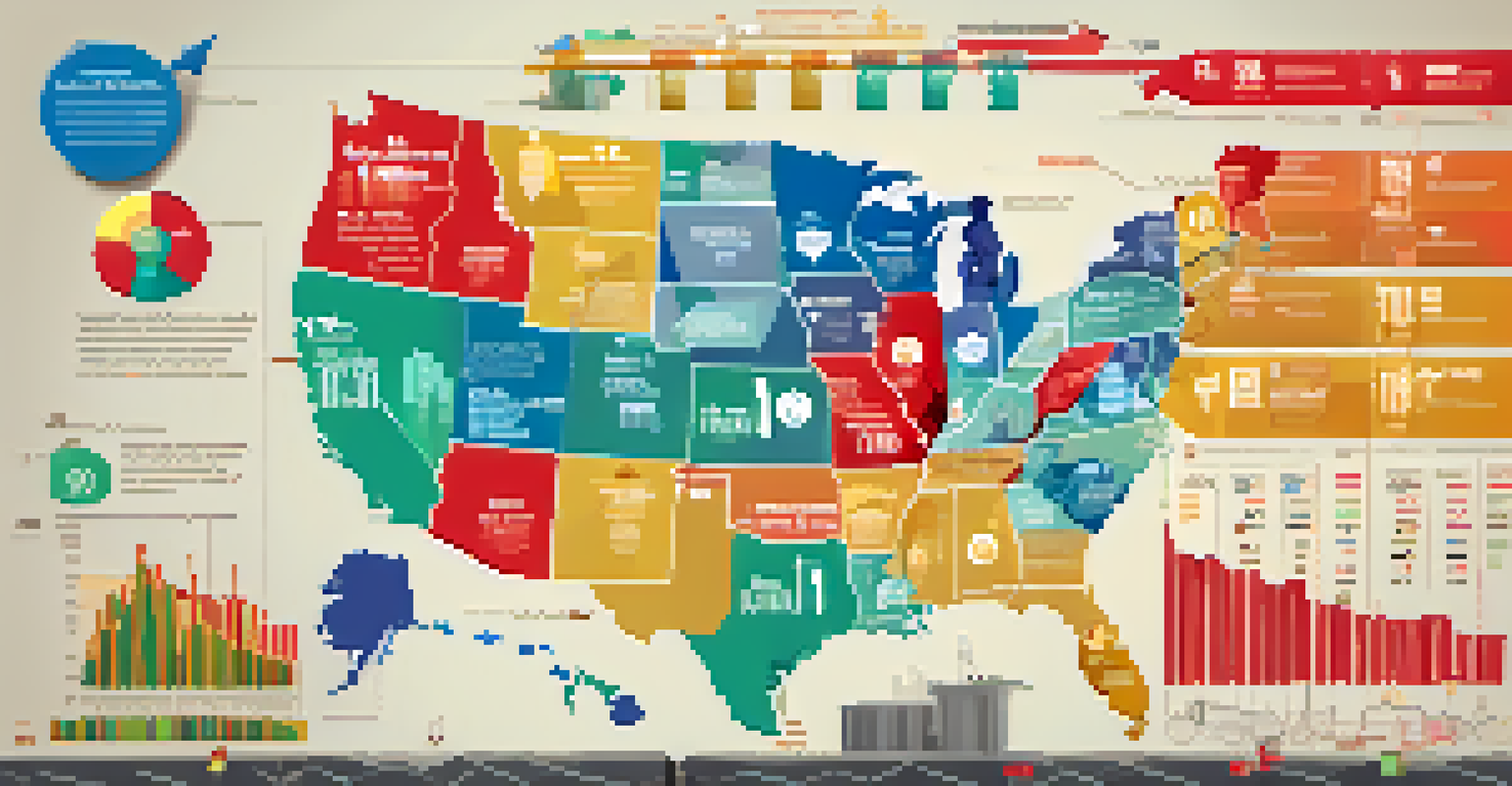How Inflation Affects Wages: A Closer Look at Compensation

What Is Inflation and Why Does It Matter?
Inflation refers to the general increase in prices of goods and services over time. It's a crucial economic indicator because it affects purchasing power, which ultimately impacts how much people can buy with their wages. When inflation rises, each dollar you earn buys less, making it a significant concern for households and businesses alike.
Inflation is the crabgrass in your savings.
For example, if inflation is at 3% and your salary remains the same, you're effectively earning less in real terms. This mismatch can lead to frustration among workers as they struggle to maintain their standard of living. Understanding inflation helps individuals grasp why wage discussions are so vital in economic policy.
Inflation not only impacts individual consumers but also shapes broader economic trends, including employment rates and business profitability. As prices rise, companies may face pressure to adjust wages to retain talent, making the relationship between inflation and compensation a critical area of focus.
How Inflation Affects Wage Growth
Wage growth is often closely tied to inflation rates. When inflation is high, workers typically demand higher wages to keep pace with the rising cost of living. Employers must then decide whether to meet these demands or risk losing their workforce to competitors who offer better compensation.

For instance, during periods of significant inflation, like the 1970s in the United States, many companies had to increase wages substantially to attract and retain employees. This scenario highlights the direct link between inflation and wage adjustments, as businesses strive to maintain a motivated and productive workforce.
Inflation Reduces Purchasing Power
As inflation rises, the value of money decreases, impacting how much individuals can afford to buy with their earnings.
However, not all industries respond to inflation in the same way. Some sectors may experience lagging wage growth due to budget constraints or market conditions, leading to disparities in how different groups of workers are affected by inflation.
The Real Wage Dilemma: Inflation vs. Pay Raises
Real wages refer to income adjusted for inflation, reflecting the true purchasing power of earnings. When inflation outpaces wage increases, workers may find their real wages stagnating or even declining, which creates a dilemma. They may receive nominal pay raises, but if these increases don't keep up with inflation, they are effectively earning less.
The greatest danger in times of turbulence is not the turbulence; it is to act with yesterday's logic.
Imagine receiving a $1,000 raise in a year where inflation is 5%. If your cost of living increases by that same percentage, your purchasing power hasn’t improved, and you may still struggle to afford basic necessities. This scenario is frustrating for many workers who feel that their hard work is not being rewarded adequately.
The real wage dilemma emphasizes the importance of negotiating for salaries that consider inflation. Workers who understand this relationship can advocate for fair compensation that reflects not just their performance but also the economic realities they face.
Impact of Inflation on Different Income Groups
Inflation does not affect all income groups equally; low-income households often feel the squeeze more acutely. They typically spend a larger portion of their income on essential goods and services, which tend to rise in price during inflationary periods. This makes it challenging for them to keep up, creating a cycle of financial strain.
For example, families living paycheck to paycheck may find it increasingly difficult to afford groceries, gas, and rent when inflation is high. This situation can lead to discussions about minimum wage increases and other forms of support aimed at helping those most impacted by rising costs.
Wage Growth Linked to Inflation
High inflation typically leads workers to demand higher wages to keep pace with the cost of living, prompting businesses to evaluate their compensation strategies.
On the other hand, higher-income individuals may have more flexibility in their budgets to absorb inflationary pressures. This disparity highlights the need for tailored economic policies that consider the unique challenges faced by different segments of the population.
The Role of Minimum Wage in Inflationary Times
Minimum wage laws play a significant role in how inflation affects overall wage dynamics. When inflation rises, there are often calls to increase the minimum wage to help low-income workers keep up with the cost of living. This can spark debates about the potential impacts on employment and business costs.
For instance, some argue that raising the minimum wage during inflation can provide essential relief to struggling workers. However, critics often express concerns that higher labor costs may lead to job losses or increased prices, creating a complex balancing act for policymakers.
Ultimately, discussions around minimum wage adjustments during inflationary periods are crucial. They reflect broader concerns about equity, economic growth, and the living standards of the most vulnerable members of society.
Inflation Expectations and Employee Negotiations
Employee negotiations around wages can be significantly influenced by inflation expectations. If workers anticipate rising prices, they are more likely to push for higher salaries during performance reviews or contract negotiations. This proactive approach can lead to better compensation packages for employees who understand the economic landscape.
Consider a scenario where inflation is projected to rise due to supply chain disruptions. Employees aware of this trend may use it as leverage to negotiate raises, arguing that their current compensation does not reflect the future cost of living. This creates a dynamic where both parties must consider inflation in their discussions.
Minimum Wage Adjustments Needed
Discussions around increasing the minimum wage during inflation are crucial to support low-income workers facing rising costs of essential goods and services.
Understanding inflation expectations also empowers employers. If companies can anticipate employee concerns and adjust their compensation strategies accordingly, they can foster a more satisfied and productive workforce while maintaining control over operational costs.
Navigating Wage Adjustments in an Inflationary Economy
Navigating wage adjustments in an inflationary economy requires strategic planning from both employees and employers. For workers, staying informed about economic trends and understanding their value in the job market can help them negotiate better compensation. They should also be prepared to present data or examples that support their requests.
Employers, on the other hand, must balance the need to attract and retain talent with the financial health of their businesses. This may involve conducting regular market analyses to ensure that salaries are competitive, even amid rising inflation. By being proactive, companies can avoid potential employee dissatisfaction and turnover.

Ultimately, successful navigation of wage adjustments during inflation hinges on open communication and collaboration between employers and employees. Both parties benefit when they understand each other's challenges and work together toward solutions that reflect the realities of the economy.